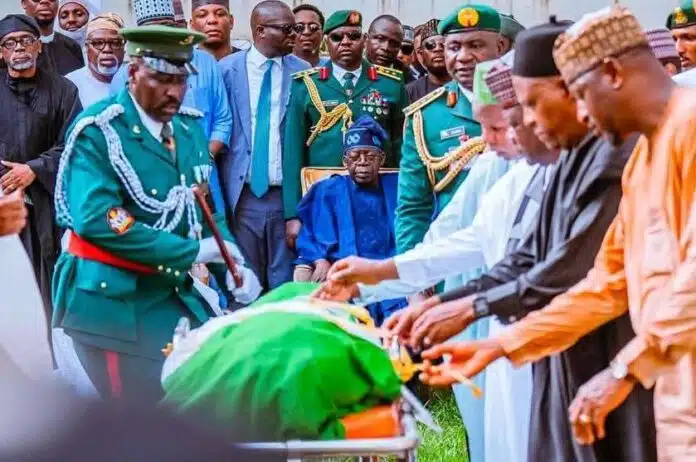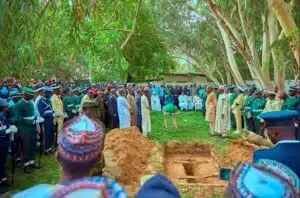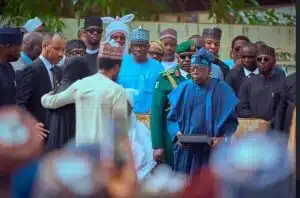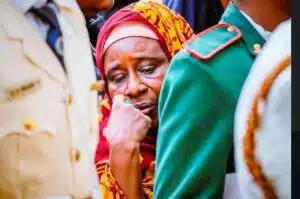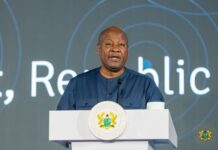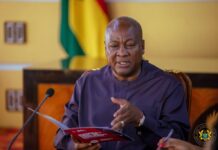Daura, Katsina State – Nigeria bid a solemn farewell to former President Muhammadu Buhari, who was laid to rest in his hometown of Daura, Katsina State, on Tuesday, July 15, 2025, following his death in a London hospital on Sunday at the age of 82. The nation observed a public holiday to honor the late leader, with the Nigerian flag flown at half-mast as part of a seven-day national mourning period.
Buhari, a former military ruler (1983–1985) and democratically elected president (2015–2023), passed away after a brief illness, according to Vice-President Kashim Shettima, who accompanied his body back to Nigeria. His coffin, draped in Nigeria’s green and white flag, arrived at Katsina airport, where President Bola Tinubu, Guinea-Bissau President Umaro Sissoco Embaló, Niger Republic Prime Minister Ali Lamine Zeine, and former Vice-President Yemi Osinbajo were among the dign cubiertaaries present. Thousands of mourners, including traditional leaders and supporters chanting “Sai Baba,” gathered in Daura, some climbing trees to catch a final glimpse as the casket was lowered into a grave in the grounds of his home.
The burial was marked by military honors, including a 21-gun salute and the ceremonial folding and presentation of the national flag to Buhari’s family. His first daughter, Fatima, was seen in tears as the family prepared for the ceremony.
A Legacy of Service and Controversy
Buhari, a retired army general, was a towering figure in Nigerian history, one of only two leaders to serve as both a military head of state and a democratically elected president. Rising to prominence after a 1983 coup, he returned to power in 2015 by defeating incumbent Goodluck Jonathan, a historic victory for an opposition candidate. His presidency focused on anti-corruption, security, and economic reforms, earning him a devoted following, particularly in northern Nigeria, where his austere lifestyle and perceived integrity were widely admired.
President Tinubu hailed Buhari as “a patriot, a soldier, a statesman” with an “unshakable belief in Nigeria’s potential,” while the Emir of Katsina, Abdulmumini Usman, called him “the pride of the North.” Tributes poured in from world leaders, including Saudi Arabia’s Crown Prince Mohammed bin Salman, Morocco’s King Mohammed VI, and ECOWAS President Omar Touray, who praised Buhari’s contributions to democracy and African integration.
However, Buhari’s tenure was not without criticism. His administration struggled with economic recession, foreign currency shortages, and escalating insecurity, including Boko Haram’s expansion and other armed conflicts that killed thousands and displaced millions. Human rights concerns also emerged, with detentions of political opponents and journalists drawing scrutiny. Some Nigerians, reflecting on social media, expressed mixed sentiments, with critics citing unfulfilled promises, while supporters celebrated his commitment to discipline and service.
Conspiracy Theories Resurface
Buhari’s death reignited controversial claims, notably from the Indigenous People of Biafra (IPOB), whose leader, Nnamdi Kanu, had long alleged that Buhari died in 2017 and was replaced by an impostor, “Jubril from Sudan.” IPOB described the announcement of his death as a “vindication” of Kanu’s claims, sparking renewed online debate, though no official confirmation has substantiated these theories.
A Nation Reflects
As Nigeria mourns, leaders and citizens alike are reflecting on Buhari’s complex legacy. The Ooni of Ife, Oba Adeyeye Enitan Ogunwusi, described his passing as “the end of a remarkable chapter,” while former Defence Minister Bashir Salihi Magashi praised his “iconic integrity.” The Alumni Association of the National Institute (AANI) called him an “embodiment of integrity, accountability, and selfless leadership.”
Buhari’s death marks the close of an era for Nigeria, a nation he served with unwavering dedication, leaving behind a legacy that will continue to shape political discourse. His family, including his wife, Aisha, who made an emotional plea for forgiveness on his behalf, and the Nigerian people find solace in his enduring impact as a leader who championed order and discipline.


